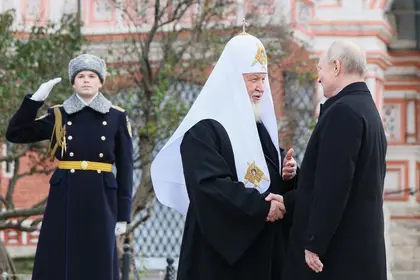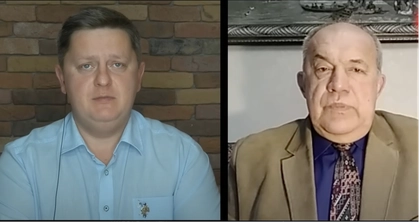Since the Russian invasion of Ukraine first began in 2014, Russian aggression has included often-overlooked religious elements accompanied by the cynical use of religious narratives weaponized by Russian President Vladimir Putin and Russian Orthodox Patriarch Kirill.
Ukrainian religious communities in areas under Russian occupation have faced years of suppression and discrimination. Following Russia’s full-scale invasion in 2022, the religious dimensions of Russia’s war of aggression have spread as Russia expands and intensifies its attacks on the Ukrainian people and culture. This has included the repression of beliefs as well as physical attacks on religious leaders, relics, and places of worship.
JOIN US ON TELEGRAM
Follow our coverage of the war on the @Kyivpost_official.
In spite of Russia’s crimes, Ukrainian society remains resilient, united, and determined to resist. In a demonstration of this unity and tenacity, a delegation of high-level religious leaders from the All-Ukrainian Council of Churches and Religious Organizations (AUCCRO) recently visited Washington DC to highlight the impact of Russia’s ongoing invasion on religious communities and Ukraine’s religious freedom. Christian, Jewish, and Muslim members of the delegation participated in a panel discussion to address these topics together with members of the American public.
The delegation arrived in the US at a critical time amid political debate over a new aid package for Ukraine. The religious leaders had a unified message of thanks for the United States and a shared request for continued support. They underlined that Ukraine is engaged in a battle for the future of global security that is also a fight for freedom of religion.

Holiday Spirit Thrives Among Ukrainians Despite War, Study Finds
Russia’s full-scale invasion has changed the nature of religious life in Ukraine. Religious communities have been forced to confront the violence of the invasion and adapt as members are impacted by the war, including suffering war crimes and facing religious persecution at the hands of Russian occupation forces.
Archbishop Yevstratiy Zoria of the Orthodox Church of Ukraine stated that Ukrainians are “eyewitnesses of Russian atrocities.” This was echoed by Chief Rabbi Bleich, who stressed that Ukraine’s religious leaders “represent millions of people that were displaced, the women and children being killed every single day.” Further emphasizing the impact of the Russian invasion on today’s Ukraine, Bishop Ivan Rusyn of the Ukrainian Evangelical Church said the war “is about the very existence of our freedom, identity, values, and culture.”
The delegation acknowledged the importance of Ukraine’s pluralistic religious landscape and addressed concerns, often spread by those questioning the legitimacy of aid to Ukraine, about the religious climate in the country. Freedom of religion is a critical part of modern Ukrainian society. In stark contrast, the Kremlin authorities in Russian-occupied regions of Ukraine have suppressed these freedoms along with other basic human rights.
As Bishop Ivan Rusyn explained, those living in temporarily occupied territories are being targeted simply for practicing a faith different to that imposed by Russia. An investigation into Russia’s religious persecution in occupied regions of Ukraine found 43 cases of targeted persecution of clergy and more than 109 acts pressuring churches and religious figures representing Orthodox Christians, Catholics, Protestants, Muslims, and Jehovah’s Witnesses since the start of Russia’s full-scale invasion.
Expert testimony at the United Nations has highlighted incidents of violence against Ukrainian religious communities included disappearances, arbitrary detention, torture, and unlawful deportations perpetrated by Russian forces against clergy and members of religious communities.
Beyond Russian-occupied territory and across the whole of Ukraine, religion has been physically targeted. In a February 2023 report, the Institute of Religious Freedom found that nearly 500 religious sites and spaces were damaged, destroyed, or looted during the first year of the Russian invasion.
Bishop Rusyn highlighted the grave impact of Russia’s war on Ukraine’s religious communities and recounted how his seminary in the Kyiv suburb of Bucha had been struck by six Russian missiles. “We have pastors and chaplains who were murdered,” he stated , imploring American audiences to “please hear our cry.”
Shelby Magid is deputy director at the Atlantic Council’s Eurasia Center. Mercedes Sapuppo is a program assistant at the Atlantic Council’s Eurasia Center.
The views expressed in this opinion article are the author’s and not necessarily those of Kyiv Post.
You can also highlight the text and press Ctrl + Enter







